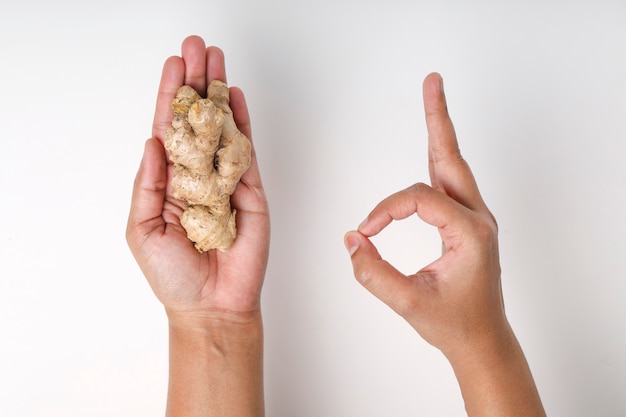Ginger and Cancer Treatment
Ginger (Zingiber officinale) is native to Asia. It is one of the most common healing spices in the world. Its root is used as a condiment in kitchen, as well as in a variety of alternative therapies against many disorders such as cancer, nausea and vomiting, slow digestion, and erectile dysfunction. But let’s focus on using ginger against cancer and the side effects of the treatment.
It is known that cancer patients sometimes eat ginger to fight against nausea and vomiting during cancer treatment. This can help when the problem is caused by radio-chemotherapy, but not always, after surgery.
Ginger and Breast Cancer
A recent study conducted among women with breast cancer, at an advanced stage, indicates that taking ginger (1.5 g / d) can relieve nausea and vomiting after administration of chemotherapy TAC regimen consisting of docetaxel (Taxotere), doxorubicin hydrochloride (Adriamycin) and cyclophosphamide. The effect occurs 6 to 24 hours after taking the ginger. It is also found in other studies that the spice can prevent tumor cells from developing or reproducing in the breast.
However, ginger does not always work in cases of nausea and vomiting associated with chemotherapy due to the fact the spice works mostly at the level of the stomach, while nausea and vomiting associated with chemotherapy are rather due to its effect on the central nervous system (CNS), on which ginger has little effect.
The American Institute for Cancer Research claims there is no proven ginger anti cancer, although other studies have demonstrated otherwise. Recent studies have shown this powerful spice is even more effective than many anti-cancer drugs, which proved totally ineffective, and sometimes accelerate the death of cancer patients. Along with a healthy lifestyle and diet, regular consumption, even in small doses, can therapeutically surpass advanced pharmaceutical cancer drugs currently recommended by the conventional medicine.
Ginger and Prostate Cancer
In a recent study conducted at Georgia State University, whole ginger extract has been able to considerably reduce the size of prostate tumors in mice. The researchers found that ginger extract can reduce the size of prostate cancer by up to 56%, which is challenging for most cancer medications on the market.
It turns out that drugs against cancer are not only highly inefficient, but can actually increase the size of the tumor, facilitate the development of other cancers (metastases), thus accelerating the death of patients. High costs do not mean better. In fact, some very expensive drugs are not much better than the death penalty for many patients. Worst, once a tumor becomes metastatic, that is, it becomes larger and stronger than its original size, it is very aggressive and more difficult to be overcome by alternative or conventional treatment. This is why most people who are successful with alternative therapies tend to be those who did not take chemotherapy and/or radiation.
As we all know, drugs do not heal cancer or any disease; they just are used to manipulate, and the result is often fatal. Raghu Kalluri, chairman and professor of the Department of Cancer Biology and the director of the Metastasis Research Center at the University of Texas MD Anderson Cancer Center, states the following; “Whatever manipulations we’re doing to tumors can inadvertently do something to increase the tumor numbers to become more metastatic, which is what kills patients at the end of the day.”
Therefore, it is always better to recourse to traditional health solution whenever it is possible. All studies conducted on ginger and cancer treatment conclude that ginger has no side effects and can be safely used to help patients. And this is not new to medical science.
It has been used as condiment and medicine by many cultures for countless centuries. Instead of creating super tumors, whole ginger extract demonstrated to be able to kill significantly cancer cells in the prostate and other organs. Over 17 Other studies have reached similar conclusions about the anti-cancer benefits of ginger, and its properties in positively impacting more than 101 diseases.
From drinking the tea to adding it to food, there are many ways you can take ginger. But if you want to use to fight cancer, here is a simple but effective recipe below you can use.
Recipe
Maybe you have known this recipe; many people say they have great results by taking it, and post it online. You need two ingredients for this recipe: raw unfiltered honey and fresh ginger root; this cancer remedy fight cancerous cells without causing any side effects.
Ingredients and method of preparation:
Take 2 large cleaned ginger roots, and then mix them in a blender with raw and unfiltered honey. Store the mixture in a pot and take 1 teaspoon 3-4 times a day.
It is very important to use a wooden, plastic or ceramic spoon; using a metal spoon can reduce healing properties of the remedy. Take it faithfully; after a week or so you should start feeling the beneficial effects.

Ginger can have an anticoagulant effect and lower the level of sugar in the blood. If you are taking any drug or supplement which has the same effects (especially in the case of warfarin, fenprocoumon, and salicylates such as aspirin), it is recommended to inform your doctor before you use ginger.
For the same reasons, caution is advised during simultaneous consumption of ginger and other food supplements capable of lowering the blood sugar: garlic, aloe vera, beta glucans, milk thistle, coenzyme Q10, turmeric, ginkgo, ginseng, omega-3 or EPA / DHA fish fatty acids.
It is also recommended for patients to talk to their health care provider before taking ginger if they are taking medications which have anticoagulant effect: garlic / quercetin, milk thistle, turmeric extract, grape seed / resveratrol, ginkgo, ginseng, flaxseed, omega-3 fatty acids or fish EPA / DHA, quercetin, vitamin E.
People with gallstones should also consult their doctor before consuming ginger.
References:
- American Institute for Cancer Research. Dietary Options for Cancer Survivors. 2002.
- Bloch A. et al. Eating well, Staying well During and After Cancer. American Cancer Society, 2004.
- Benefits of whole ginger extract in prostate cancer: PMID: 21849094, [PubMed – indexed for MEDLINE] PMCID: PMC3426621
- Ginger-derived compound 6-shogaol Inhibits Breast Cancer Cells and Stem Cell-Like Spheroids by Modulation of Notch Signaling Pathway and Induction of Autophagic Cell Death: Published: http://dx.doi.org/10.1371/journal.pone.0137614 . Retrieved June 20, 2016
- Del Fabbro B. et al. Nutrition and the Cancer Patient. Oxford University Press, 2010.
- Panahi Y1 et al. Effect of ginger on acute and delayed chemotherapy-induced nausea and vomiting: a pilot, randomized, open-label clinical trial.Integr Cancer Ther. 2012 Sep;11(3):204-11. Epub 2012 Feb 7.
- www.umm.edu/altmed
- http://nccam.nih.gov
- www.mskcc.org
- www.nlm.nih.gov/medlineplus
- Ishiguro K, Ando T, Maeda O, Ohmiya N, Niwa Y, Kadomatsu K, et al. (2007) Ginger ingredients reduce viability of gastric cancer cells via distinct mechanisms. Biochem Biophys Res Commun 362: 218–223. pmid:17706603 doi: 10.1016/j.bbrc.2007.08.012 PubMed/NCBI
- Gan FF, Nagle AA, Ang X, Ho OH, Tan SH, Yang H, et al. (2011) Shogaols at proapoptotic concentrations induce G(2)/M arrest and aberrant mitotic cell death associated with tubulin aggregation. Apoptosis 16: 856–867. doi: 10.1007/s10495-011-0611-3. pmid:21598039 PubMed/NCBI
- Chen CY, Liu TZ, Liu YW, Tseng WC, Liu RH, Lu FJ, et al. (2007) 6-shogaol (alkanone from ginger) induces apoptotic cell death of human hepatoma p53 mutant Mahlavu subline via an oxidative stress-mediated caspase-dependent mechanism. J Agric Food Chem 55: 948–954. pmid:17263498 doi: 10.1021/jf0624594 PubMed/NCBI
- Hung JY, Hsu YL, Li CT, Ko YC, Ni WC, Huang MS, et al. (2009) 6-Shogaol, an active constituent of dietary ginger, induces autophagy by inhibiting the AKT/mTOR pathway in human non-small cell lung cancer A549 cells. J Agric Food Chem 57: 9809–9816. doi: 10.1021/jf902315e. pmid:19799425 PubMed/NCBI
- Ling H, Yang H, Tan SH, Chui WK, Chew EH (2010) 6-Shogaol, an active constituent of ginger, inhibits breast cancer cell invasion by reducing matrix metalloproteinase-9 expression via blockade of nuclear factor-kappaB activation. Br J Pharmacol 161: 1763–1777. doi: 10.1111/j.1476-5381.2010.00991.x. pmid:20718733 PubMed/NCBI
- Tan BS, Kang O, Mai CW, Tiong KH, Khoo AS, Pichika MR, et al. (2013) 6-Shogaol inhibits breast and colon cancer cell proliferation through activation of peroxisomal proliferator activated receptor gamma (PPARgamma). Cancer Lett 336: 127–139. doi: 10.1016/j.canlet.2013.04.014. pmid:23612072 PubMed/NCBI
- Ishiguro K, Ando T, Watanabe O, Goto H (2008) Specific reaction of alpha,beta-unsaturated carbonyl compounds such as 6-shogaol with sulfhydryl groups in tubulin leading to microtubule damage. FEBS Lett 582: 3531–3536. doi: 10.1016/j.febslet.2008.09.027. pmid:18805415 PubMed/NCBI
- Alvero AB, Chen R, Fu HH, Montagna M, Schwartz PE, Rutherford T, et al. (2009) Molecular phenotyping of human ovarian cancer stem cells unravels the mechanisms for repair and chemoresistance. Cell Cycle 8: 158–166. pmid:19158483 doi: 10.4161/cc.8.1.7533 PubMed/NCBI
- Prince ME, Sivanandan R, Kaczorowski A, Wolf GT, Kaplan MJ, Dalerba P, et al. (2007) Identification of a subpopulation of cells with cancer stem cell properties in head and neck squamous cell carcinoma. Proc Natl Acad Sci U S A 104: 973–978. pmid:17210912 doi: 10.1073/pnas.0610117104 PubMed/NCBI
- Zhang S, Balch C, Chan MW, Lai HC, Matei D, Schilder JM, et al. (2008) Identification and characterization of ovarian cancer-initiating cells from primary human tumors. Cancer Res 68: 4311–4320. doi: 10.1158/0008-5472.CAN-08-0364. pmid:18519691 PubMed/NCBI
- Liu S, Dontu G, Wicha MS (2005) Mammary stem cells, self-renewal pathways, and carcinogenesis. Breast Cancer Res 7: 86–95. pmid:15987436 doi: 10.1186/bcr1021 PubMed/NCBI
- Dontu G, Jackson KW, McNicholas E, Kawamura MJ, Abdallah WM, Wicha MS (2004) Role of Notch signaling in cell-fate determination of human mammary stem/progenitor cells. Breast Cancer Res 6: R605–615. pmid:15535842 doi: 10.1186/bcr920 PubMed/NCBI
- Al-Hajj M, Wicha MS, Benito-Hernandez A, Morrison SJ, Clarke MF (2003) Prospective identification of tumorigenic breast cancer cells. Proc Natl Acad Sci U S A 100: 3983–3988. pmid:12629218 doi: 10.1073/pnas.0530291100 PubMed/NCBI
- Kakarala M, Brenner DE, Korkaya H, Cheng C, Tazi K, Ginestier C, et al. (2010) Targeting breast stem cells with the cancer preventive compounds curcumin and piperine. Breast Cancer Res Treat 122: 777–785. doi: 10.1007/s10549-009-0612-x. pmid:19898931 PubMed/NCBI
- Ray A, Meng E, Reed E, Shevde LA, Rocconi RP (2011) Hedgehog signaling pathway regulates the growth of ovarian cancer spheroid forming cells. Int J Oncol 39: 797–804. doi: 10.3892/ijo.2011.1093. pmid:21701772 PubMed/NCBI
- Fillmore CM, Kuperwasser C (2008) Human breast cancer cell lines contain stem-like cells that self-renew, give rise to phenotypically diverse progeny and survive chemotherapy. Breast Cancer Res 10: R25. doi: 10.1186/bcr1982. pmid:18366788 PubMed/NCBI
- Li Y, Zhang T, Korkaya H, Liu S, Lee HF, Newman B, et al. (2010) Sulforaphane, a dietary component of broccoli/broccoli sprouts, inhibits breast cancer stem cells. Clin Cancer Res 16: 2580–2590. doi: 10.1158/1078-0432.CCR-09-2937. pmid:20388854 PubMed/NCBI



